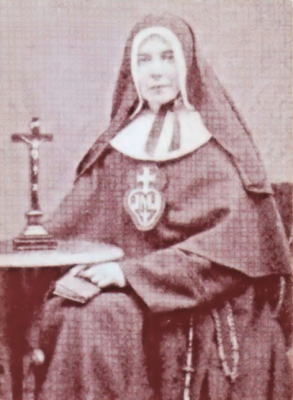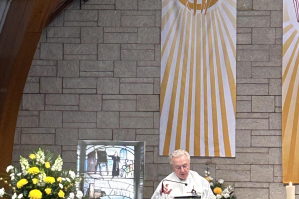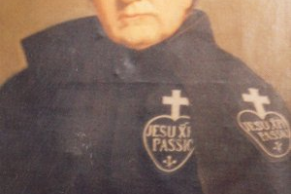Text: Bishop Mark Davies at Mass for Venerable Elizabeth Prout

Venerable Elizabeth Prout
Source: Diocese of Shrewsbury
The Rt Rev Mark Davies, Bishop of Shrewsbury, gave the following homily at a Mass celebrated for the Venerable Elizabeth Prout in the Church of St Anne and Blessed Dominic, Sutton, St Helens, on Saturday 7 May.
Homily at Mass for the Venerable Elizabeth Prout
On this day of Eastertide, we hear the words of Simon Peter "Lord to whom shall we go?" In the gentle company of three great figures of the Second Spring of the Catholic Church in our land - Blessed Dominic Barberi, the Venerable Ignatius Spencer and our own Mother Mary Joseph, now the Venerable Elizabeth Prout - we repeat Peter's profession of faith in the Eucharistic presence of the Lord Jesus: "We believe; we know that you are the Holy One of God". These three witnesses - Dominic, Ignatius and Elizabeth - awaken in our hearts the fulness of the Church's faith and the courage of a new evangelisation. They all shared the Passionist charism, yet each would be called along distinctive paths. Elizabeth Prout set out, as I did earlier today, from the banks of the River Severn in Shrewsbury, to the completion of her mission here in the North of England.
At the Bicentenary of her birth in Shrewsbury, I reflected on her witness to human dignity and the value of every human life in the growing towns and cities of industrial England. Yet today I want to reflect on how Elizabeth was quite unexpectedly led to fulfil this mission through education; and how her Sisters of the Cross and Passion have followed this same path the world over. She would begin this educational mission in the worst of Manchester's slums held in the grip of a cholera epidemic. Human conditions would never favour her mission, whether in overcrowded classrooms; mixed age groups; the absence of resources and the hinderances of public authorities to the Catholic Church's place in education. The very extremity of these conditions allows us to see the supernatural purpose of this tireless commitment to education. Mother Mary Joseph saw her mission in education as more than imparting information and human skills, rather a vital opportunity in times of social upheaval to pass on faith and the precious inheritance of Christian values. Her concern was specifically for young women destined to become, not merely factory workers, but the mothers of the next generation. She saw in them the Christian women who would be able to bring that feminine dignity and genius, of which Saint John Paul II eloquently spoke, into a coarsened and dislocated social life. It was significant that Elizabeth Prout's first inspiration was to promote devotion to the Holy Family of Nazareth.
Today, we see clear parallels in western societies marked by a not dissimilar coarsening of life, of womanhood and a dislocation in the life of home and family. The bitter inheritance, not of industrial development, but of secularist ideologies. In her own time Mother Mary Joseph recognised at the root of these maladies, an abject state of ignorance which she fearlessly set out to address. An ignorance once again evident in the highly-educated societies of the West, where opinion surveys routinely disclose that many no longer even know the significance of Easter or Christmas. We are encountering the same religious illiteracy which Elizabeth Prout found in the dark slums of Angel Meadow. An ignorance which leaves a vacuum and exposes new generations to destructive ideologies of every kind.
Elizabeth herself was led by a sequence of events, to the peripheries of society of Victorian society, to give witness to the perennial newness of the Christian message that, in the words of the new Directory for Catechesis, "God has revealed Himself and revealed a new life - life without sin, life as his children, life in abundance, eternal life …". "What news is more beautiful than this?" asked Saint John Chrysostom many centuries before, "God on earth and humanity in heaven!" In Pope Francis's words, Elizabeth recognised the world receives this message of hope "not from evangelisers who are dejected, discouraged, impatient or anxious, but from ministers of the Gospel whose lives glow with fervour, who have first received the joy of Christ". This had been her own, personal discovery in the Christ-centred spirituality of Saint Paul of the Cross.
Today, we might recognise that this is the moment that the Venerable Elizabeth Prout is being raised up beyond the religious communities who have long kept her charism alive and cherished her memory so as to continue her mission still more widely at a moment of family and social crisis. As Mother Mary Joseph once laboured in the Second Spring of the Church's life, so she will serve as a witness in the springtime of the New Evangelisation. Today, we have gathered to pray that she will soon be recognised among the Blessed of every time and place and become an inspiration in the vital task of handing on the faith and the inheritance of Christian values, amid the adverse conditions which today impact family and community. May our prayers hasten the day which will allow Mother Mary Joseph's mission to continue and grow on a still greater scale. A mission which certainly did not cease when finally laid to rest in Saint Helens on that distant January day in 1864. In returning to the Gospel text of this Easter day, we ask that amid all the confusion of the crowds today, may she help many to discover faith in the same Eucharistic Jesus, so they will be able to say with Peter and all the Church: "We believe, we know that you are the Holy One of God."

















